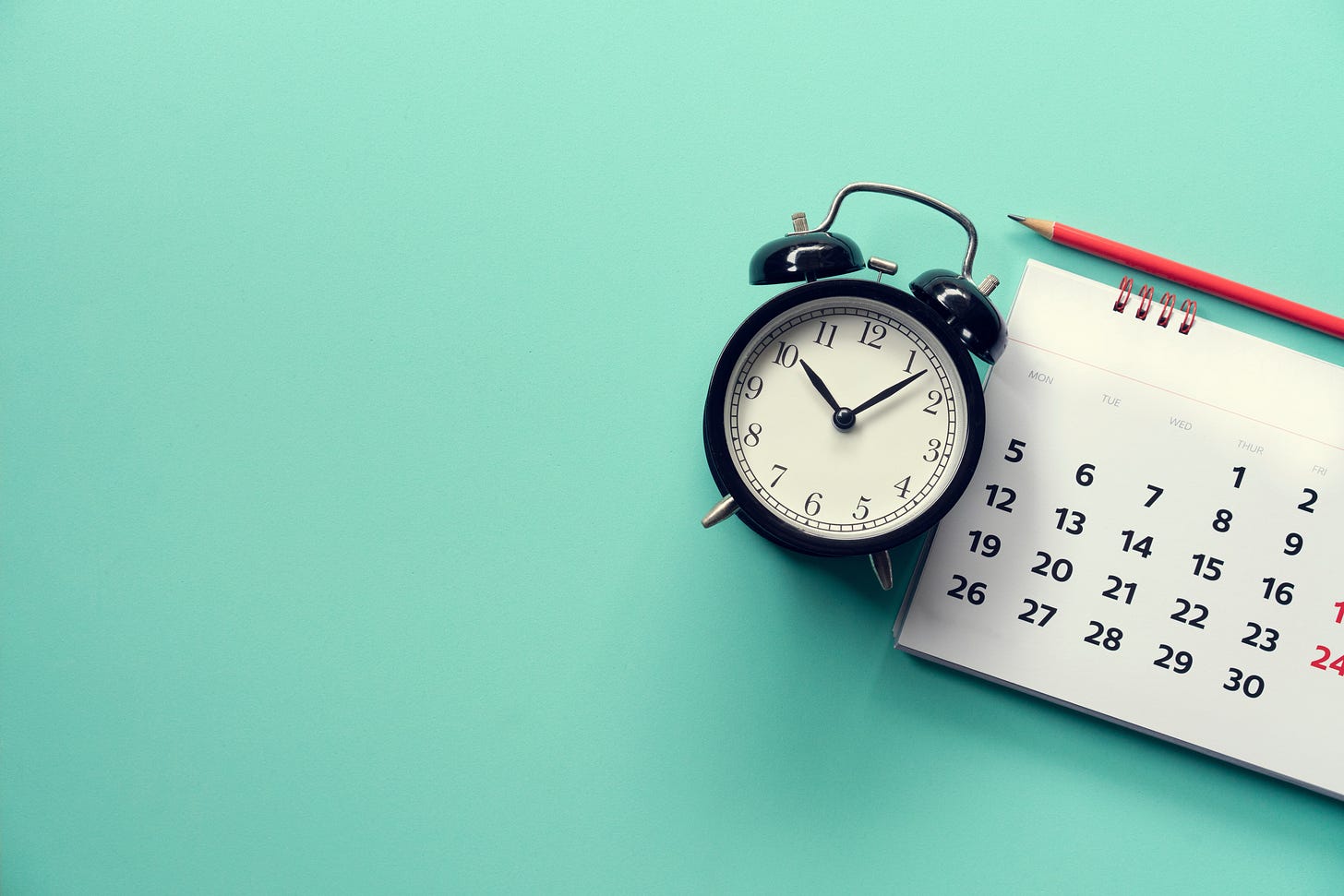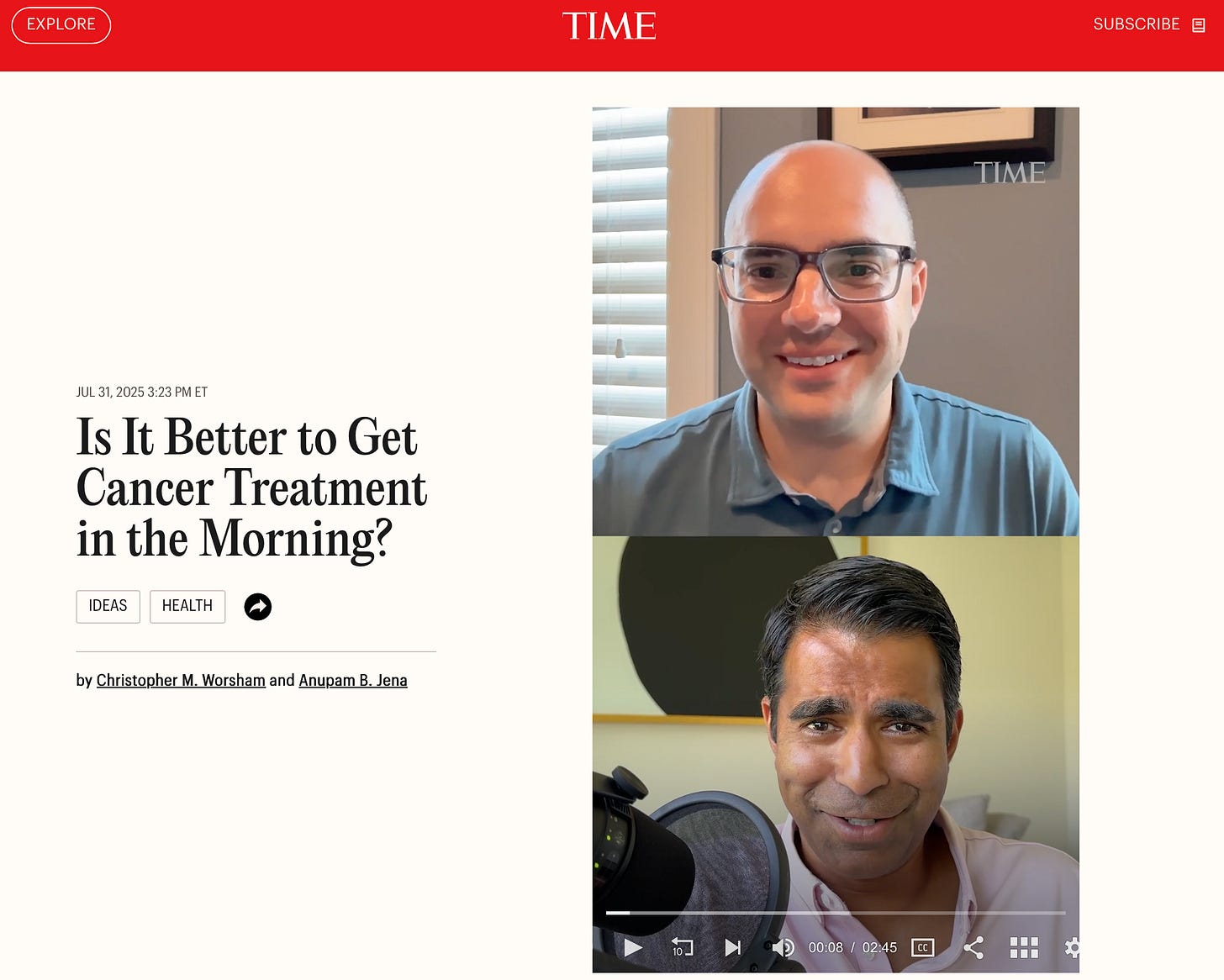Is it better to get cancer treatment in the morning?
Preliminary findings from a study presented at an international cancer research conference suggest timing of certain treatments may be a critical consideration
We are pleased to announce that we’ll be contributing regularly to the TIME Ideas series, and we plan on sharing what we write and having discussion with you here—sometimes with additional content that we think you’ll find interesting!
Let’s start with a simple question: If your doctor’s office called you to schedule an appointment in the morning or the afternoon, does it matter which appointment you pick?
In many scenarios, the answer is probably no—since most of the time, the benefits of picking an appointment that is convenient to you will likely outweigh any differences in care at different appointments.
But there are 3 ways in which the time of day you see your doctor could influence your health outcomes:
Your body or the treatment you receive could actually function differently at different times of day, impacting outcomes
Your doctor may provide different care at different times of day
People who tend to see the doctor in the morning may be different than those who tend to see the doctor in the afternoon. Those differences might impact outcomes.
Does the human body work differently at different types of day?
In our new article out in TIME Ideas, we dive into this first scenario in light of a new study of patients with advanced lung cancer who were randomized to receive an immunotherapy treatment (called a checkpoint inhibitor) at different times of day—with striking results.
Do doctors provide different care at different times of day?
Prior studies have shown that yes, there can be differences in care provided to patients at different times of day. For example, studies of primary care clinics in a Pennsylvania health system showed that that patients seen later in the day were less likely to have their primary care doctor order recommended cancer screening tests, to receive a flu shot, or to be prescribed cholesterol-lowering medication. Meanwhile, surgeons are more likely to have patients experience complications following a non-emergent operation late, compared to early, in the day.
It could be that staffing and resource levels in the facility could differ in the afternoon, leading to differences in care. It might also be the case that doctors are more fatigued or rushing to finish on time at the end of the day, and in turn, make different medical decisions. This idea is reminiscent of a highly publicized study of judges in Israel, which found that judges became progressively less likely to grant parole to prisoners toward the end of a block of cases, and were subsequently more likely to rule favorably for prisoners immediately following a lunch break—more on this later.
But unlike decisions made in the primary care office or operating room, once a cancer patient is started on a treatment, care typically follows protocols with little room for variation. Indeed, in this new study of cancer patients discussed above, the cancer patients received highly protocolized care—suggesting that the care provided was likely similar regardless of the time of day it was given.
Are the patients who come for morning appointments different than patients who come for afternoon appointments?
In many situations where care is similar regardless of whether patients come in the morning or afternoon, the important next question to ask is about the patients themselves. Are patients who choose morning appointment times similar to those who choose afternoon appointments? If they’re different, it’s possible that any differences seen between morning and afternoon appointments can be explained—at least in part—by factors besides the specific timing of treatments.
Patients who make appointments for treatment of the same condition are going to be different from one another. Some patients might have limited mobility, or the symptoms of their condition (e.g. pain or shortness of breath) may be of different severity. If patients they know they will need more time to come in, patients who might be struggling more—who we would also expect to generally not do as well compared to patients who aren’t struggling as much—may choose afternoon appointments if it’s challenging to come in the morning. It could also be that patients with fewer resources at home (for example, patients who don’t have a car, can’t spare money on a rideshare app, etc.) tend to come later in the day when more assistance might be available to them.
If this is the case, it’s hard to disentangle whether different appointment times are leading to different outcomes for patients, or if it’s because patients who were always going to do better or worse tend to choose appointments at certain times of day. Many studies try to account for these differences, but there are always many potential contributing factors that aren’t measured, like the level of resources at home that might dictate both appointment times and the patient’s overall survival times. Randomized controlled trials—like this new one randomizing cancer patients to appointments at different times of day—are one way to avoid bias from these other potential contributors.
The study of the Israeli judges offers an important lesson in this regard. Subsequent analyses of the judges’ cases found that the cases presented before a lunch break were different than the cases presented after the break, suggesting that other case factors besides the judges’ fatigue and hunger leading up to a break could have explained the findings.
Thank you for reading Random Acts of Medicine! Please share any thoughts you have in the comments section. We look forward to bringing more thought-provoking topics in health care right to your inbox!




